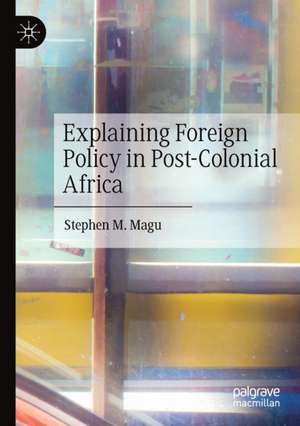Explaining Foreign Policy in Post-Colonial Africa
Autor Stephen M. Maguen Limba Engleză Paperback – 3 ian 2022
| Toate formatele și edițiile | Preț | Express |
|---|---|---|
| Paperback (1) | 783.35 lei 6-8 săpt. | |
| Springer International Publishing – 3 ian 2022 | 783.35 lei 6-8 săpt. | |
| Hardback (1) | 787.15 lei 6-8 săpt. | |
| Springer International Publishing – 2 ian 2021 | 787.15 lei 6-8 săpt. |
Preț: 783.35 lei
Preț vechi: 955.31 lei
-18% Nou
Puncte Express: 1175
Preț estimativ în valută:
149.91€ • 155.62$ • 125.00£
149.91€ • 155.62$ • 125.00£
Carte tipărită la comandă
Livrare economică 24 martie-07 aprilie
Preluare comenzi: 021 569.72.76
Specificații
ISBN-13: 9783030629328
ISBN-10: 3030629325
Ilustrații: XVI, 349 p. 1 illus.
Dimensiuni: 148 x 210 mm
Greutate: 0.48 kg
Ediția:1st ed. 2021
Editura: Springer International Publishing
Colecția Palgrave Macmillan
Locul publicării:Cham, Switzerland
ISBN-10: 3030629325
Ilustrații: XVI, 349 p. 1 illus.
Dimensiuni: 148 x 210 mm
Greutate: 0.48 kg
Ediția:1st ed. 2021
Editura: Springer International Publishing
Colecția Palgrave Macmillan
Locul publicării:Cham, Switzerland
Cuprins
Chapter 1: The Beginning of a Post-Colonial Foreign Policy in Africa
Chapter 2: Conceptual Approaches to Foreign Policy and Application to African Countries
Chapter 3: Politics of Geography, Statehood, Residual Colonization and Territorial Integrity
Chapter 4: Africa Huru! Complex Events - Cold War, Residual Colonization and Apartheid
Chapter 5: Nation vs. Continent: Sovereignty, Territorial Integrity and Rebellion
Chapter 6: Made in Europe: Breaking Nations, Secession Movements and OAU Responses
Chapter 7: Region or Continent: O/AU Development and Regional Economic Communities
Chapter 8: Between BRICs’ Promise and Past Western Trauma: Whither, Africa?
Chapter 9. Africa’s Post-Colonial Foreign Policy: Assessing History, Imagining the Future
Recenzii
“Explaining Foreign Policy in Post-Colonia! Africa, by Stephen M. Magu, is a welcome addition to the increasing number of books dealing with African agency within the international sphere. … this is a welcome book and an interpretation of the considerations that have informed the choices made. … Explaining Foreign Policy in Post-Colonia! Africa is a useful and welcome addition to the panoply of literature on Africa’s post-colonial politics.” (Kwesi Aning, Yearbook on the African Union, Vol. 2, 2021)
Notă biografică
Stephen M. Magu’s research focuses on international political economy, economic development, governance and foreign policy issues as relating to Africa. He is the author of Great Powers and US Foreign Policy towards Africa (2019), Peace Corps and Citizen Diplomacy: Soft Power Strategies in U.S. Foreign Policy (2018) and The Socio-Cultural, Ethnic and Historic Foundations of Kenya’s Electoral Violence: Democracy on Fire (2018), and co-editor of Corruption Scandals and their Global Impacts (with Omar Hawthorne, 2018).
Textul de pe ultima copertă
This book explores foreign policy developments in post-colonial Africa. A continental foreign policy is a tenuous proposition, yet new African states emerged out of armed resistance and advocacy from regional allies such as the Bandung Conference and the League of Arab States. Ghana was the first Sub-Saharan African country to gain independence in 1957. Fourteen more countries gained independence in 1960 alone, and by May 1963, when the Organisation of African Unity (OAU) was formed, 30 countries were independent. An early OAU committee was the African Liberation Committee (ALC), tasked to work in the Frontline States (FLS) to support independence in Southern Africa. Pan-Africanists, in alliance with Brazzaville, Casablanca and Monrovia groups, approached continental unity differently, and regionalism continued to be a major feature. Africa’s challenges were often magnified by the capitalist-democratic versus communist-socialist bloc rivalry, but through Africa’s use and leveraging of IGOs – the UN, UNDP, UNECA, GATT, NIEO and others – to advance development, the formation of the African Economic Community, OAU’s evolution into the AU and other alliances belied collective actions, even as Africa implemented decisions that required cooperation: uti possidetis (maintaining colonial borders), containing secession, intra- and inter-state conflicts, rebellions and building RECs and a united Africa as envisioned by Pan Africanists worked better collectively.
Stephen Magu’s research focuses on international political economy, economic development, governance and foreign policy issues as relating to Africa. He is the author of Great Powers and US Foreign Policy towards Africa (2019), Peace Corps and Citizen Diplomacy: Soft Power Strategies in U.S. Foreign Policy (2018) and The Socio-Cultural, Ethnic and Historic Foundations of Kenya’s Electoral Violence: Democracy on Fire (2018), and co-editor of Corruption Scandals and their Global Impacts (with Omar Hawthorne, 2018).
Caracteristici
Takes an institutional and continental approach to analyzing the major issues in post-colonial Africa
Studies the conditions that made African countries decide to keep the colonial boundaries even though each country hated them
Captures the importance of the early years of independence, especially with decolonization of the remaining countries in southern Africa, the Apartheid government, and Ian Smith’s Rhodesia
Studies the conditions that made African countries decide to keep the colonial boundaries even though each country hated them
Captures the importance of the early years of independence, especially with decolonization of the remaining countries in southern Africa, the Apartheid government, and Ian Smith’s Rhodesia
